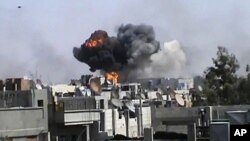Syria's nearly week-old cease-fire continued to deteriorate Wednesday as a bombing killed six Syrian law enforcement officers and government forces continued to shell and attack a number of towns and cities across the country.
The violence continued despite the presence of a U.N. observer team.
Witnesses say Syrian government security forces opened fire on a crowd of protesters in a Damascus suburb Wednesday, after a team of U.N. observers left the area following a brief visit. It was not immediately clear if there were any casualties.
Syrian artillery also pounded an area of Homs Wednesday, despite a cease-fire that went into effect last Thursday. Several opposition districts have come under sporadic and at times heavy shelling each day since the truce started.
The state-run SANA news agency says an "armed terrorist group" detonated an explosive device planted on a road in the northern Idlib province. It also says a sniper killed a police officer in the southern city of Daraa.
The Syrian government has said it has the right to respond to attacks from what it calls "terrorists."
Moroccan Colonel Ahmed Himiche, who heads the U.N. team, said its mission is proceeding despite the violence. He said the U.N. team's job is to act as a go-between with Syrian officials and other parties in a technical mission of monitoring.
In a meeting with Chinese officials in Beijing Wednesday, Syrian Foreign Minister Walid al-Moallem said that Damascus was ready to allow the U.N. to boost the strength of its mission. He said that most observers will be deployed to areas that Syria considers to be hot spots and he agrees that it would be logical to increase the size of the U.N. team to 250 members.
View the timeline
U.N. Secretary-General Ban Ki-moon said Tuesday that the U.N. mission in Syria will need helicopters to help it move around the country, urging member states to help. Moallem said that the Syrian air force was ready to help the team if the need arose.
Timor Goksel, a former spokesman of the U.N.'s UNIFIL mission in Lebanon, told VOA that he thinks the U.N. observer team will make a difference in Syria, since it can draw on the expertise and assets of two U.N. missions already present along the Golan Heights.
"There is a significant U.N. presence in [Syria] since 1974. [So], these new observers are not coming blind to the situation. They will have good advice from the U.N. people in the country," he said.
Goksel adds that the observers are not going to be relying on the Syrians for their communications needs or for any kind of logistical support.
Goksel says he doesn't think the U.N. mission is going to solve the problem in Syria, but that he believes it may "manage the conflict somewhat, reducing tensions and reducing the bloodshed."
| Join the conversation on our social journalism site - Middle East Voices. Follow our Middle East reports on Twitter and discuss them on our Facebook page. |
